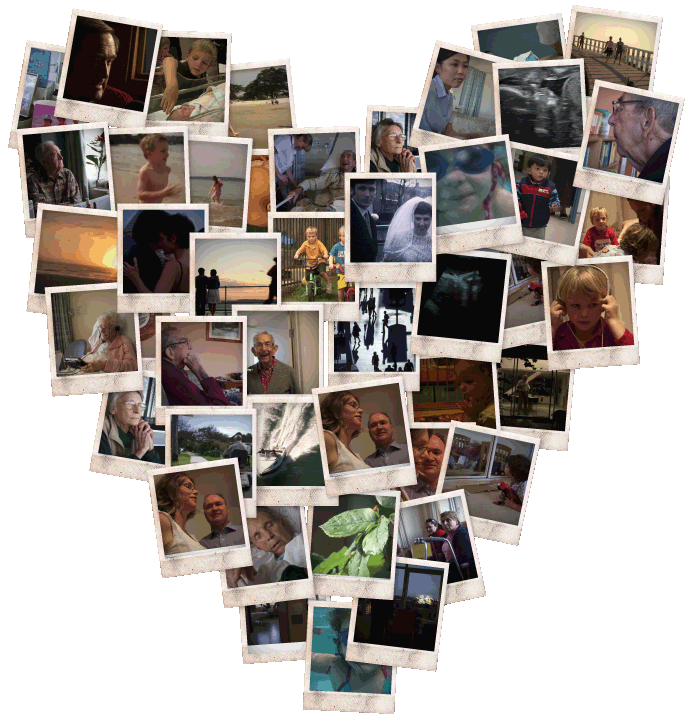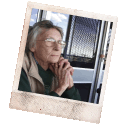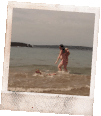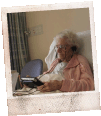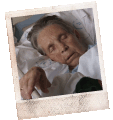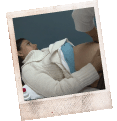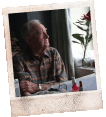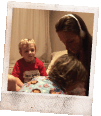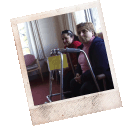Testimonials
Dr Tom Murray’s stunning documentary Love in Our Own Time is a fascinating and timely exploration of what it means to love in the face of loss and feel truly alive. There is a growing social movement about changing the way we deal with death and dying in Australia. There are many communities who continue to practise rituals around death and grief; sadly however, there are many for whom dying well is a concept far removed. The Groundswell Project works in partnership with some of Australia’s leading arts and health organisations to promote resilience and well being in response to end of live issues and to encourage people to build their death literacy.
Love in Our Own Time makes a powerful contribution towards inter-generational learning and sharing and a re-investment into living a life that truly matters. We thank Tom Murray and his team for this seminal work.
Jessie Williams
Chair
The Groundswell Project (thegroundswellproject.com)
This is an amazing and beautiful film which I have now watched several times and also used with a peer group of psychologists for our own professional development. It provoked very rich discussion about birth, life and death, relating it to our own personal experiences and reflecting on our practice with clients. I see it as having potential use with a wide variety of health and helping professionals as it certainly deepened my own appreciation of what it is like for the families in the film. I don’t think I have seen anything close to this in depicting so well the process of dying and that experience for the terminally ill and their families. The film is able to balance this with sensitive use of space and imagery that enables reflection during the course of the film. Showing the beginnings and endings of life, this film took me deeply into my own reflections on life. I am grateful to the individuals and families who were willing to share their intimate moments and enable us to see what is far too often concealed from view in our society.
Ian MacDonald
Psychologist and Executive Coach
The screening of this important documentary film at the Royal Australian & New Zealand Section of Psychotherapy 2013 Binational Conference was a great success. The participants’ general feedback was that it was a daring endeavour, masterfully executed and impressive in its impact from a variety of perspectives. Firstly we were struck by the honesty and simplicity of the concept that confronted us with realities that many in western society manage to deny or avoid – simply love, life and death and their relationship. As clinicians we are among a few in society allowed to share these intimacies with our patients, usually in private or in small family groups. Rarely do we get the chance to do so with colleagues, and it is even more rare for others from outside the health profession to be allowed to enter this space. The film took us into this intimate space as is rarely allowed. It is a testament to the generosity of those that it filmed and a privilege for us viewers.
Dr Jeffrey Streimer
RANZCP NSW Director Advanced Training in the Psychotherapies
Consultant Psychiatrist & Psychotherapist
Clinical Senior Lecturer University of Sydney
World Hospice and Palliative Care Day is a unified day of action to raise awareness of hospice and palliative care around the world and provided the perfect opportunity for us to host Adelaide’s premier screening of Love in Our Own Time.
While so many people avoid talking about death and dying like it is the plague, those of us who work in hospice and palliative care know such conversations, although sad, they are also often encouraging, inspiring and sometimes downright funny.
It was these little morsels of humour woven through the tapestry of stories about the lives of seven Australian families which saw our audience wavering between laughter and contemplation from beginning to end.
Love in Our Own Time portrayed these rich conversations with grace, dignity and beauty giving the audience real insight into the importance of being willing to enter into the sacred space of someone’s dying, death and grief – and further, that anyone is capable of doing so with just a little encouragement.
For me the film captured the essence of founder of the Hospice movement Dame Cicely Saunders well known quote “You matter because you are you, and you matter to the end of your life. We will do all we can not only to help you die peacefully, but also to live until you die.” The film highlights that perversity of nature in that it is not until we learn time is limited that we really start to live and understand what is important.
So many philosophers, writers and poets quotes are captured in the film, none more so than Pope Paul IV, (1897-1978) “Somebody should tell us, right at the start of our lives that we are dying. Then we might live life to the limit, every minute of every day. Do it! I say. Whatever you want to do, do it now! There are only so many tomorrows.”
Tracey Watters
Chief Executive, Palliative Care South Australia
pallcare.asn.au
Love in Our Own Time is a wonderfully sensitive film. It offers a marvellously intimate portrait of the beginnings and ending of life. I endorse it as a great resource for professionals involved in these areas, and for anyone who needs to gain some insight into these challenging times of life.
Dr John Cottrell-Dormer
Senior Staff Specialist Psychiatrist & Psychotherapist
Love in Our Own Time is a film like no other I have seen. It situates the most profound elements of the human story – our entrance and exit – within the familiar, and even mundane – our own time (and place – our country, our city). Rather than dreaming of elsewhere, it stands comfortably, and warmly, in here and now.
As a doctor, my work in some ways is an attempt to be helpful to people who come to see me, but also to think about interesting problems. The film reminds me that what I do is a small element in a bigger, more complex, human story. It challenges me to see that my role is to help the story unfold, rather than be at its centre. I think this would be a good film for those working or hoping to work in the health professions to experience because it reminds us that there is much more than the details that we master.
Love in Our Own Time challenges me to think about what it is about this life that is important. The privilege of being able to glimpse something of the lives and stories of real people waiting for a birth or a death invites me to think about what these things mean to me, and how I might negotiate their happening. Rather than hide details behind closed (often hospital) doors, the corporeal, emotional and human reality of them takes an overdue centre stage. Life is fragile, and rich and strong and meaningful in our sharing of it with others.
Dr Kristof Mikes-Liu BA MBBS FRANZCP Cert Child Adol Psych MCFT
Child and Adolescent Psychiatrist
Love in Our Own Time is an immensely moving, sensitive, and powerful film.
I thought during the movie that it would end in births and deaths but I had no idea it would so sensitively explore the process and capture such moments of intimacy so well. I admired the doctor for taking part and also for his capacity to explain and debrief his staff about why the little things are so important. Having worked in medical oncology years ago I could totally relate to what he was saying and how he interacted with colleagues and families so respectfully.
It is an amazing film. I think it is a ‘must see’ for all medical, nursing and allied health students because the general principles of care demonstrated are pivotal to a good clinician’s training and professional practice.
Child and Adolescent Psychiatrist, Sydney
Tom Murray’s documentary Love in Our Own Time gives expression to the Trinitarian version of love: three Greek words eros, philia and agape united in one English word. His narratives,commencing with birth and ending with death, fill in the gap between theory and practice. We are confronted in this documentary by expressions of love at the beginning of life and at the end. These two versions of love ‘in time’ bookend the daily love shown to one another in professional relationships. It is a love of neighbour that doesn’t aim at self but the other. As a silent observer the camera captures moments of caring, of love and laughter, of sadness and heartache. It is a privileged position to be in for an audience not attuned to such intimate moments. It is in the intimacy of these relationships that Tom Murray teaches us something about Love in Our Own Time.
Dr Garry Nieuwkamp
Accident and Emergency Physician and Bioethicist
Wyong Hospital, Wyong, NSW
Love in Our Own Time is an extremely sensitive exposition of the most profound milestones of the human condition – Birth and Death. We intimately share in the private joys and griefs of the participating families. The filming is honest without guile, gentle and sensitive without excessive sentimentality and at times almost brutally honest. The reoccurring imagery of the microcosm of the indoors juxtaposed with the movement and activity of the outside world enhances our appreciation of the journey of our lives and the significant events that give it meaning. The trust that the families have placed in Tom Murray by allowing him to film these usually most private events is justly rewarded in a truly amazing documentary that reveals people at their most vulnerable.
Elizabeth Logan
Watching the movie caused me to relive the dying process that we experienced with my dad, but in a very helpful way. Seeing other people express their suffering and grief during the long goodbye, in ways that were similar to mine, made this more of a shared experience and ultimately not so lonely. Just when I thought the emotional overload of grief was becoming too much, the mood was lifted with a birth. The balance on screen between sadness and joy (and so many emotions in between) helped me keep some kind of balance with the many emotions I was experiencing. I cried more than two tissues worth of tears and sometimes found I was holding my breath and had to remind myself to breathe. The movie was beautifully and sensitively made, and definitely one to be seen by all.
Julie Hamilton
Love in Our Own Time captures a difficult topic in such a respectful and dignified way. It is a wonderfully inspiring piece of work. In watching the film, I felt we had the special privilege of sharing some very intimate moments of peoples’ lives that can help give us strength and a powerful context in dealing with the many emotional times we will no doubt face in the years ahead. Life is such a myriad of unexpected experiences and I know that death is something I really struggle to accept and deal with. I lost my Granddad not so long ago and he went through a very similar experience to the beautiful souls featured in the film. Being so far away I wasn’t able to be there in his last few months of life as he battled with an aggressive cancer. I feel I can now begin to understand what this must have been like for him and my family.
Matthew Brine
The Fundraising People
An intimate insight into dying, death and birth. Beautifully shot and directed, Love in our Own Time brought me to tears and also made me laugh. As someone very interested in [working in] end of life and after life care, I feel privileged to have witnessed and shared these events. A must see!
Lissanne Oliver
Author – TV Presenter – Organiser, SORTED!
I watched Love in Our Own Time just a month before a friend was diagnosed with terminal cancer. The film prepared me for discussing death with my friend and his wife, as well as helping me to understand and process my own feelings of grief. I found out yesterday that my friend is now in the final stages of the disease and has just a few weeks to live. The film continues to help me on this horrible journey.Thank you to everyone involved in making this film. Your film helped me be a better friend. I’ve been able to offer better understanding and support because of its insights. I believe this film needs a much larger audience.
Laura, Sydney
I saw this important and emotionally moving film on Saturday, hosted by The GroundSwell Project. Such a beautiful reminder of the cycle of life, of our fragilities and strengths, of the utmost important things to us, emphasised by all accounts, and worth the DVD purchase to watch again and again, and to assist with perspective on life. Thank you to Tom Murray, Madeleine Hetherton, Vanessa Milton and Caitlin Yeo for making this film.
Helen Dunne
Shroud Memento (funeralshrouds.com.au)
Love in Our Own Time: Simply, a wonderful documentary.
I cried tears of sadness, tears of happiness, and tears of pure joy.
It would be easy to describe the film as a lyrical juxtaposition between life just beginning and life’s final breaths. But the film is much more than that. It is an ode to love.
There is the instantaneous love between mother and child at birth.
There is the love felt between families as they gather around dying relatives.
There is also the loving bond expressed between doctors, midwifes and staff with their patients and their families.
Then there is the love that we feel as audience and witness: Feeling for each and every patient, mother and baby and their families with genuine affection. We are filled with a loving admiration for all of those who professionally guide the process of lives starting and ending with a wonderful sense of love and respect.
Indeed, Love in Our Own Time is a beautiful ode to love.
Ivan de Vulder
Last week’s Family Systems Institute screening was attended by over 40 people who were deeply moved by the experience. While us humans tend to avoid confronting the reality of death there was a sense of intimate focus created by watching people in families confront dying (and birth). Irrelevant pettiness in relationships gets put to the side to see what is really important. A number of viewers purchased DVDs to watch with their loved ones. This film can facilitate people finding a way to reflect and to talk about important matters of life and death. Thank you to Tom Murray and team for the gift of this elevating and tender film.
Jenny Brown
Director, The Family Systems Institute (thefsi.com.au)
